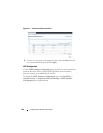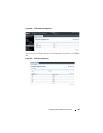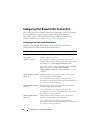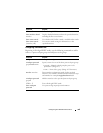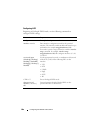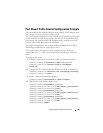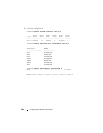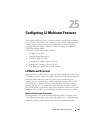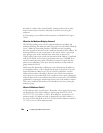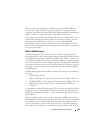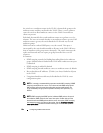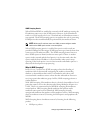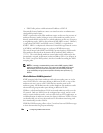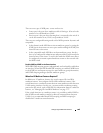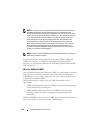
804 Configuring L2 Multicast Features
desirable as it reduces the network load by sending packets only to other
hosts/switches/routers that have indicated an interest in receiving the
multicast.
If L2 snooping is not enabled, multicast packets are flooded in the ingress
VLAN.
What Are the Multicast Bridging Features?
The Dell Networking series switches support multicast forwarding and
multicast flooding. For multicast traffic, the switch uses a database called the
Layer 2 Multicast Forwarding Database (MFDB) to make forwarding
decisions for packets that arrive with a multicast destination MAC address. By
limiting multicasts to only certain ports in the switch, traffic is prevented
from going to parts of the network where that traffic is unnecessary.
When a packet enters the switch, the destination MAC address is combined
with the VLAN ID, and a search is performed in the Layer 2 MFDB. If no
match is found, then the packet is flooded. If a match is found, then the
packet is forwarded only to the ports that are members of that multicast
group within the VLAN.
Multicast traffic destined to well-known (reserved) multicast IP addresses
(control plane traffic) is always flooded to all ports in the VLAN. The well-
known IP multicast addresses are 224.0.0.x for IPv4 and FF0x:: for IPv6.
Multicast data traffic is flooded to all ports in the VLAN if no multicast
router ports have been identified. Once a multicast router port is identified,
multicast data traffic is forwarded to the multicast router ports. The MFDB is
populated by snooping the membership reports sent to the multicast routers.
This causes multicast data traffic to be forwarded to any hosts joining the
multicast group.
What Is L2 Multicast Traffic?
L3 IP multicast traffic is traffic that is destined to a host group. Host groups
are identified by class D IPv4 addresses, which range from 224.0.1.0 to
239.255.255.255, or by FF0x:: or FF3x:: IPv6 addresses. In contrast to L3
multicast traffic, L2 multicast traffic is identified by the MAC address, i.e.,
the range 01:00:5e:00:00:00 to 01:00:5e:7f:ff:ff:ff for IPv4 multicast traffic or
33:33:xx:xx:xx:xx for IPv6 multicast traffic.



